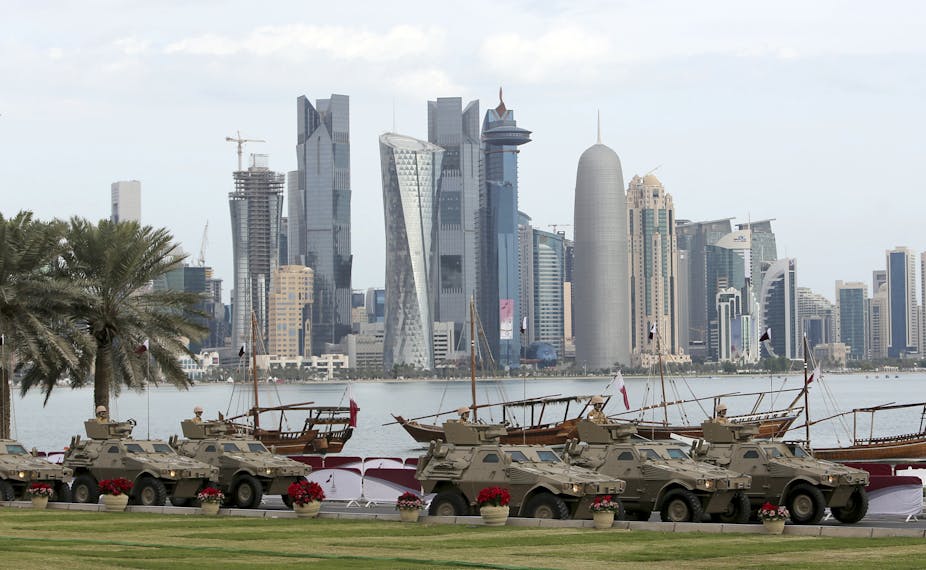Ten years on from the adoption of the Responsibility to Protect (R2P) at the UN World Summit, many have reflected on R2P’s achievements, – such as its increased invocation by the Security Council and affirmation at various General Assembly debates – and speculated as to its future.
Among the many R2P-related stories that have appeared during 2015, Qatar proudly announced that it had appointed an “R2P Focal Point”, a senior official responsible for promoting R2P at a national level. A few months later, it was announced that Qatar had become one of 49 states in the “Group of Friends of the Responsibility to Protect”.
At the UN informal interactive dialogue on R2P, Qatar’s ambassador declared: “Qatar has always contributed to Protection of Civilians and the application of international law and peaceful settlement of conflicts.” Later in the month, Qatar called on the General Assembly to draft and pass an R2P resolution.
These commitments were warmly welcomed by R2P-related NGOs on social media. Simon Adams, executive director of the Global Center for the Responsibility to Protect (GCR2P), even posted a photo of himself meeting with Qatar’s R2P Focal Point, engaged in a discussion on “ending impunity for atrocity crimes in Syria”.
Given Qatar’s appalling record on human rights and its deeply problematic role in the Middle East, this enthusiasm for its attachment to the R2P network seems utterly misguided – and it bodes ill for the future of R2P.
Serial violator
You don’t have to look far to question the sincerity of Qatar’s commitment to protect its own population. Political parties are banned; Freedom House lists the country’s press status as “not free” – and the judicial system is routinely prey to political interference. In May 2015, the Office of the High Commissioner for Human Rights highlighted pervasive torture, discrimination and the systemic abuse of women’s rights, including cases of unmarried mothers being imprisoned.
Qatar has also been widely criticised for its treatment of foreign labourers – including many that are building stadiums for the benighted 2022 World Cup – which has led to thousands of deaths among the workers, who are prohibited from joining unions. Amnesty International recently noted that “little has been done” to redress the “rampant exploitation of migrants”.
And then there’s Qatar’s human rights record in the international sphere. Following the outbreak of the Arab Spring, Qatar adopted an interventionist foreign policy in an effort to control the trajectory of the movement. As a part of this policy, Qatar took part in the 2011 bombing of Libya, ostensibly to help the protesters “build their own future and institutions in a democratic framework”. Yet, at the same time, Qatar, with Saudi Arabia, sent troops into Bahrain to help the embattled monarchy employ “brutal repression” to crush pro-democracy protests.

Qatar has also been a major supplier of arms and money to various rebel factions in Syria. It has continually argued for a more forceful intervention in the Syrian civil war, yet, like its wealthy neighbours, it has declined to take in refugees fleeing the conflict it has helped to intensify and prolong.
Perhaps most troubling of all from the R2P perspective, Qatar has contributed both air power and ground troops to the Saudi-led attacks in Yemen that began in March 2015, leading to one of the most serious humanitarian emergencies in the world today. The GCR2P itself warned that all parties to the conflict “have perpetrated indiscriminate attacks … which may amount to war crimes and crimes against humanity”.
And yet, Qatar seems to have been welcomed uncritically into the fold, raising issues around R2P’s priorities.
Cost-free cynicism
While plenty of states have signed up to R2P, many have clearly done so in a spirit of brazen cynicism. Publicly avowing support for R2P is essentially cost-free – and appointing an “R2P Focal Point” imposes no actual obligations. the GCR2P offers only “suggestions” on what each Focal Point might do, stressing that its remit “should be tailored to the unique context of each individual country”.
Focal Points invariably have many other roles in government. Qatar’s is “director of the Department of International Organisations and Conferences”, and his list of seven diverse “functions” does not mention R2P.
The danger is that R2P enables oppressive regimes such as Qatar to present themselves as “responsible” even as they participate in acts that “may amount to war crimes and crimes against humanity”. Angola, Democratic Republic of the Congo, Rwanda, and Jordan all have R2P Focal Points in place, yet each been excoriated for a range of systematic internal abuses.
Among the countries who’ve declared support for R2P more generally are many well-known human rights violators – among them Bahrain, which has described R2P as a “supreme goal”, and Sudan, whose government called R2P “a sublime principle”.
The case of Qatar illustrates that the strategy of cultivating state support for R2P has come at the cost of ignoring human rights abuses. It is hardly a surprise that states are allowed to appropriate humanitarian principles when their support is prioritised over preserving the principle’s integrity.
Many terms – most gallingly “never again” – have been rendered near-meaningless due to their repeated and often cynical invocation. And because it’s so malleable and detached from political realities, R2P appears to be suffering the same fate.

